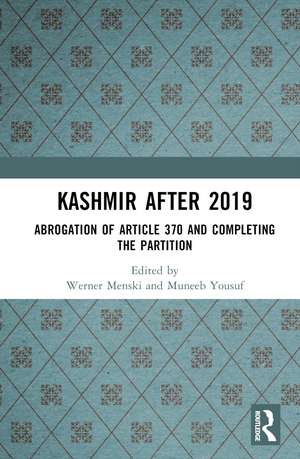Kashmir After 2019: Abrogation of Article 370 and Completing the Partition
Editat de Werner Menski, Muneeb Yousufen Limba Engleză Hardback – 21 ian 2025
The book re-traces the history of the suffering of Kashmir's people and provides an intriguing new analysis of the conflict through the plurality-conscious kite model of law and life, suggesting important policy implications. It also challenges the negative implications of international and foreign meddling in the ‘Kashmir problem’.
This book will be useful to scholars, students and teachers of political science, sociology, governance, economics, and development studies. It will also be an indispensable companion to scholars and general readers interested in India, especially Jammu and Kashmir, as well as those engaging with South Asian Studies.
Preț: 1006.09 lei
Preț vechi: 1105.59 lei
-9% Nou
Puncte Express: 1509
Preț estimativ în valută:
192.52€ • 201.41$ • 159.92£
192.52€ • 201.41$ • 159.92£
Carte tipărită la comandă
Livrare economică 02-16 aprilie
Preluare comenzi: 021 569.72.76
Specificații
ISBN-13: 9781032788227
ISBN-10: 1032788224
Pagini: 270
Ilustrații: 10
Dimensiuni: 156 x 234 mm
Greutate: 0.72 kg
Ediția:1
Editura: Taylor & Francis
Colecția Routledge India
Locul publicării:Oxford, United Kingdom
ISBN-10: 1032788224
Pagini: 270
Ilustrații: 10
Dimensiuni: 156 x 234 mm
Greutate: 0.72 kg
Ediția:1
Editura: Taylor & Francis
Colecția Routledge India
Locul publicării:Oxford, United Kingdom
Public țintă
PostgraduateCuprins
PART I: THE ANALYTICAL FRAMEWORK FOR DYNAMIC GENUINE PLURALISM IN ACTION Introduction: States, Leadership, Human Suffering and the Mythologies of Azadi 1. From Local Feudalism to Responsible Self-Governance: The Kashmir Kite 2. Flying Kashmiri Azadi Kites: Conflicts, Games or Responsible Agency? 3. Keeping It in the Family: Understanding Kashmir as an Ancestral Property Dispute PART II: CONTESTED HISTORICAL AND POLITICAL ACCOUNTS: THINGS WE KNOW AND IMPORTANT LITTLE DETAILS SOME MAY NOT WANT TO KNOW 4. Feudal Kashmir, the Princely State and Beginnings of Reform Efforts 5. Breaking the Myth of the Accession of Jammu and Kashmir 6. Legal Status of Jammu and Kashmir within the Indian Union: Reading from the Texts PART III: THE TROUBLED INTERIM PHASE OF KASHMIR (1947-2019) AND CRASHING KITES OVER SOUTH ASIA 7. Continuing Problems in Kashmir during the 21st Century 8. Pakistan’s Kashmir Policy: Blocked Desires and the Search for an Honourable Exit 9. India-Bangladesh Border Issues: Tidying Up the Colonial Mess Concluding Analysis- Post-2019 Kashmir: Completing the Partition and Facing New Challenges
Notă biografică
Werner Menski is Emeritus Professor of South Asian Laws at the School of Oriental and African Studies (SOAS), University of London, where he taught from 1981 to 2014. He developed particularly the teaching of comparative legal studies with an interdisciplinary, multidimensional South Asian focus, through courses including Legal Systems of Asia and Africa, Law and Society in South Asia and Ethnic Minorities and the Law. Apart from supervising numerous doctoral students, he published 14 books, including Muslim Family Law (with D. Pearl, 3rd edn. 1998), Modern Indian Family Law (2002, 2016), Hindu Law (2003) and Comparative Law in a Global Context: The Legal Systems of Asia and Africa (2nd edn, 2006). He has contributed almost 300 published articles, continues to be co-editor of South Asia Research and remains active in mentoring junior scholars.
Muneeb Yousuf received his PhD from the Academy of International Studies at Jamia Millia Islamia University in New Delhi. He is a Deputy Editor of South Asia Research. His research articles have been published in Studia Islamica, Contemporary South Asia and South Asia Research, among others. He also regularly writes on international affairs with a special focus on Pakistan and Kashmir and his work has appeared in Foreign Policy, The Telegraph, Al-Jazeera, The Diplomat, Frontline Magazine and several other media outlets.
Muneeb Yousuf received his PhD from the Academy of International Studies at Jamia Millia Islamia University in New Delhi. He is a Deputy Editor of South Asia Research. His research articles have been published in Studia Islamica, Contemporary South Asia and South Asia Research, among others. He also regularly writes on international affairs with a special focus on Pakistan and Kashmir and his work has appeared in Foreign Policy, The Telegraph, Al-Jazeera, The Diplomat, Frontline Magazine and several other media outlets.
Descriere
This volume portrays India’s removal of Article 370 in August 2019 as an effort to stop the suffering of its highly diverse people. Though this signified the completion of the partition of 1947, latent adherence to dreams of freedom (Azadi) indicates that this needs to be more widely understood as a viable peace-making effort.
